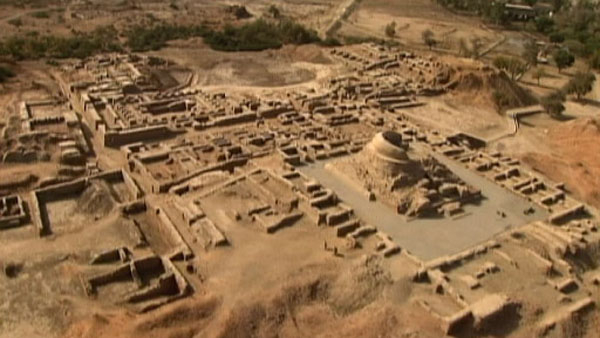An archaeological excavation carried out in the trenches at Dhaba in the upper Son river valley in central India has found evidence of human occupation in this area almost 80,000 years ago. The international team of researchers found evidence of the continuous presence of humans in this region between 80,000 years ago and 65,000 years ago.
“The lithic industry from Dhaba strongly resembles stone tool assemblages from the African Middle Stone Age (MSA) and Arabia, and the earliest artefacts from Australia, suggesting that it is likely the product of Homo sapiens as they dispersed eastward out of Africa,” wrote the authors of the study published in Nature Communications on February 25.
This finding is important in the face of competing theories on the first presence of human populations in different regions of the world and on human dispersal from Africa.
About 74,000 years ago, the Toba volcanic super-eruption, centred around Sumatra, is believed to have caused an almost decade-long spell of cold weather — a volcanic winter — across many parts of the Earth. There is an argument that this induced winter not only led to the cooling of the Earth’s surface for almost a thousand years since the eruption, but also destroyed huge populations of hominins.
“The explosion was the largest in the last 2 million years,” Michael Petraglia from the Max Planck Institute for the Science of Human History, Jena, Germany, who is a corresponding author of the paper, wrote in an e-mail to The Hindu. “It was assumed that it led to dramatic climate change and it would have decimated populations across Asia. However, the archaeological evidence from India do not support these theories,” he added.
The hypothesis is that the ‘volcanic winter’ caused a bottleneck in the gene pool of humans, because only a few survived who were in Africa at the time. Later, this population is believed to have emerged from Africa and colonised different parts of the world. However, the present study rules out this hypothesis as it implies that a population of early humans inhabited northern India even before the date of the eruption (74,000 years ago) and continued through the period of the devastation and until much later.
“We know from fossil evidence that modern humans were already out of Africa by 200,000 years ago in Greece, in Arabia and China by 80-100,000 years ago, Sumatra by soon after the Toba eruption and Australia by 65,000 years ago,” Chris Clarkson of the University of Queensland, Australia, the lead author of the study, wrote in an e-mail. “This [study] contradicts the common view that modern humans spread out of Africa only in the last 50,000 years,” he added.
The excavation unearthed a large tool industry spanning the period of the Toba super-eruption. The large Megalithic tools were dated between approximately 80,000 years and 65,000 years and the small tools were dated at approximately 50,000 years suggesting a continuous inhabiting of this region by humans undisturbed by the super-eruption. Further the similarity of the tools to ones found earlier in Africa and Arabia led the researchers to infer that they were made by Homo sapiens.
“Our finds of stone tools that are very similar to those in Arabia, Israel and Africa and even Australia associated with earlier modern humans suggests these were likely the products of modern humans,” Prof. Clarkson wrote. “The fact that we find these before and after the Toba eruption with no apparent change in technology indicates that major eruptions like Toba appear not to have had a catastrophic effect on small hunter-gatherer bands living in India at the time,” he added.
Source: The Hindu
Image Courtesy: Volunteer work in India
You may also like
-
India Can’t Afford to Remain Stagnant at this Juncture, Says PM Modi; Asks People to Buy Locally-Made Goods
-
Stolen Artefacts to be Returned to India from Scotland Museums
-
Legendary Singer Lata Mangeshkar Passes Away At the Age of 92
-
Netaji’s Hologram Statue at India Gate
-
10th Century Stone Idol of Goat Head Yogini IllegallyRemoved from A Temple in Lokhari, Banda, UP Being Returned to India
